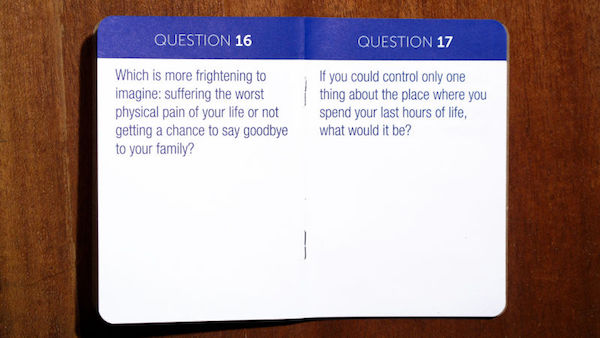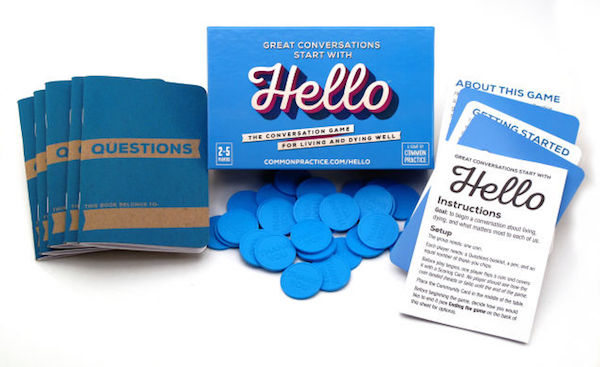By Michelle Woo
[C]all it the new game of Truth. Players go around the table answering questions in their little blue booklets, but these questions aren’t geared to get them talking about that one time they went skinny dipping in Maui. Instead, the questions aim to launch difficult conversations, ones that may be painful, ones they may have been avoiding for far too long.
“Who haven’t you talked to in more than six months that you would want to talk to before you died?”
“What music do you want to be listening to on your last day alive?”
“Which is more frightening to imagine: suffering the worst physical pain of your life or not getting a chance to say goodbye to your family?”
This game is called Hello, and its goal is to get people talking about end-of-life issues in a way that’s easy and non-threatening. The most revolutionary aspect of it—and it’s such a simple thing—is that everyone can and should play. (Newsflash, friends: we’re all gonna die.) So often when it come advance care planning conversations, we single out the person who is sick or elderly, and it can feel like an interrogation. That is, if we even get to the conversations at all. According to Nick Jehlen, the lead designer of the game, people are often too nervous or distraught to delve into these real, complex discussions, or they feel it’s never the right time. The talks, he says, “just don’t happen.”
Families, friends, organizations and healthcare teams have gotten together to play Hello, which is created by Common Practice, a company that promotes better conversations about living and dying well. Some of the questions were written by backers of the Kickstarter campaign for their original game, My Gift of Grace. The topics range from the logistical (“If you needed help going to the bathroom today, who is the first person you would ask to help you? Who would you never be able to ask?”) to the abstract (“What do you think happens to you after you leave this life?”). Each player gives out game chips—“thank you chips”— to other players as they feel moved to, which creates, as Jehlen describes, “an economy of gratitude” within the game.
Jehlen says,“It’s challenging, and sometimes people do cry, but what we’ve really done is create a set of structures that help people be supportive of each other. Almost every time I play with a new group, people share things they’ve never talked about before, and just as importantly, they feel good about it.” He adds, “It sounds crazy, but the game is fun.” Of people who play Hello, 75% go on to complete an advance care planning step within a few months.
Talking about our own mortality doesn’t just save others from guilt, trauma and expense down the road—these conversations can actually improve our quality of life. They help us to really narrow in on what matters to us here and now. Perhaps a game can help get the ball rolling.
Complete Article HERE!


